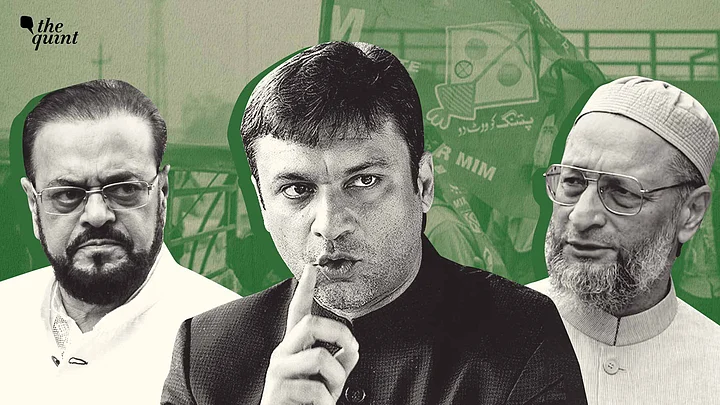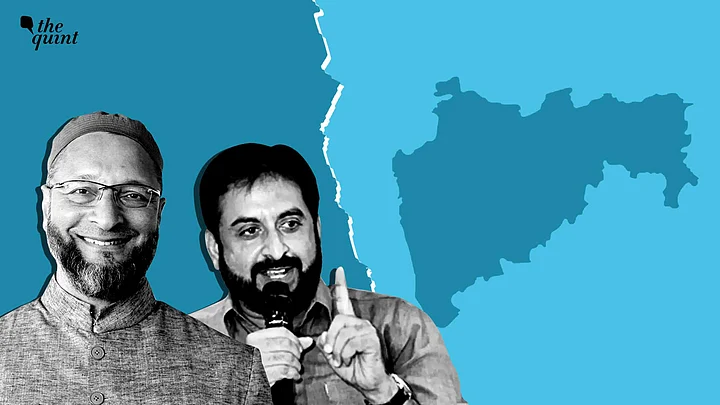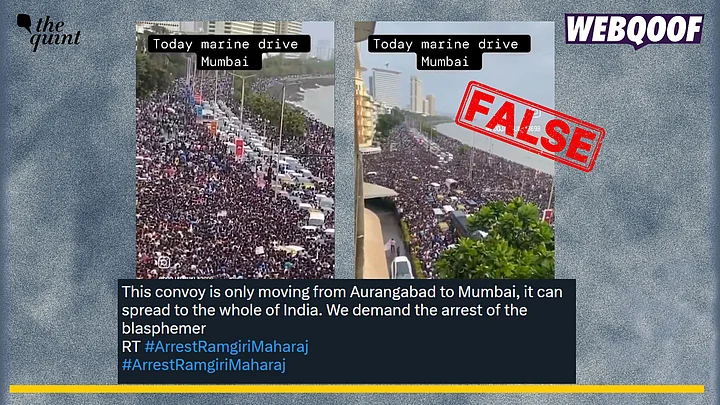It is after a gap of 10 years that Akbaruddin Owaisi has come to Maharashtra to campaign. The All India Majlis-e-Ittehadul Muslimeen hadn't deployed him in the 2019 Lok Sabha and Assembly elections in Maharashtra, in the 2024 Lok Sabha elections or any civic elections that the party contested in the state in between.
Akbaruddin Owaisi, the younger brother of AIMIM chief Asaduddin Owaisi, is the party's floor leader in the Telangana Assembly and he is known for his aggressive speeches and is a huge hit among the AIMIM rank and file.
So why hadn't AIMIM deployed him for campaigning in Maharashtra for all these years? And why is it happening now?
One reason is, of course, the fact that Owaisi was facing trial in a 2012 case of alleged hate speech and he was acquitted only in 2022. But there's more to it.
Why a 10 Year Gap for Akbaruddin Owaisi
The demography in Maharashtra isn't like AIMIM's citadel in Hyderabad's Old City or even the other area where it achieved political success, Bihar's Seemanchal region.
In Hyderabad's Old City, the seven seats that the AIMIM wins are all ones where Muslims are above 50 percent of the population. In four out of these, the community's share is over 60 percent. In Akbaruddin's seat Chandrayangutta, it is over 70 percent.
Then in Bihar's Seemanchal region, where AIMIM won 5 Assembly seats, the demographics are similar.
In Maharashtra on the other hand, there is only one seat with an overwhelming Muslim majority - Malegaon Central. Then there are a handful of seats where Muslims are 50-55 percent of the population, such as Mankhurd Shivaji Nagar and Mumbadevi but they already have established Muslim leaders from other parties.
Barring Malegaon Central, most of the seats where AIMIM has had maximum impact are ones where Muslims are under 40 percent, such as Aurangabad Central and Aurangabad Lok Sabha seat (both won by Imtiyaz Jaleel), Dhule City and Byculla.
Therefore, the AIMIM has had to expand beyond Muslim votes to compete in these seats. Jaleel's success has, in part, been due to the support of Dalit Buddhists, especially when he won the Aurangabad Lok Sabha seat in alliance with Prakash Ambedkar's VBA. It has also been because he has raised issues like water supply and healthcare, which are concerns across communities.
Akbaruddin Owaisi has a polarising image and there may have been fears that his campaigning in Maharashtra would lead to Hindu consolidation in seats where Muslims are under 40 percent and prevent any expansion of the AIMIM among non-Muslim voters.
This time, however, the situation is different.
What Has Changed This Time?
This time the AIMIM is facing a threat from within. In most of its key constituencies, candidates from within Muslims have come up who are seeking to challenge the AIMIM's hold.
For instance, in Malegaon Central, AIMIM's Mufti Ismail Abdul Khalique is up against another local leader Sheikh Aasif Rashid who has floated the curiously named Indian Secular Largest Assembly of Maharashtra (ISLAM).
But the main tussle in Maharashtra is taking place between the AIMIM and the Samajwadi Party, specifically its main leader in Maharashtra Abu Asim Azmi. Relations have clearly soured between the two sides. This wasn't always the case
In the past, Asaduddin Owaisi has openly urged people at AIMIM rallies to vote for Abu Azmi and SP leader Rais Shaikh in their respective constituencies. There was an unwritten understanding between the AIMIM and SP in Mumbai and nearby areas that the former won't put up a candidate against Azmi and Shaikh, while the latter would reciprocate the same for AIMIM's Waris Pathan.
This time, however, the understanding has ended.
It began with the SP fielding a candidate against Imtiyaz Jaleel, that too a former AIMIM leader Gaffar Qadri. Then they put up Shan-e-Hind Nihal Ahmed, daughter of former MLA Nihal Ahmed Maulvi Mohammad Usman in Malegaon Central, a seat considered strong for AIMIM.
This was despite the fact that both seats were in the Congress' quota in the Maha Vikas Aghadi seat sharing arrangement, of which the SP is a part.
As a tit-for-tat move, the AIMIM has fielded a candidate against Abu Azmi in Mankhurd Shivaji Nagar, where the SP leader is already facing a tough battle against NCP's Nawab Malik and Shiv Sena's Suresh Krishna Patil.
Barring Abu Azmi, AIMIM hasn't fielded any candidate against any major Muslim leader. In fact, it has pursued a policy of no confrontation towards Muslim candidates of the Congress and NCPSP.
It is the battle with SP and Sheikh Rashid where Akbaruddin comes into the picture. When it comes to expanding the party beyond its core base, leaders like Asaduddin Owaisi and in some parts of Maharashtra, Imtiyaz Jaleel, are the main faces.
But when it comes to the threat within their base, Akbaruddin Owaisi is the go-to person. Energising and consolidating the base is known to be his specialty.
There is a History to This
In Hyderabad, AIMIM faced its toughest election in 1994 when one of its own senior leaders Amanullah Khan split the party and formed Majlis Bachao Tehreek. In 1994, the AIMIM won only one seat - Asaduddin Owaisi in his debut election from Charminar Assembly seat. MBT, on the other hand, wrested two seats from AIMIM and became an existential threat to it.
Before the next election in 1999, Akbaruddin Owaisi, was brought back to Hyderabad (he had moved out of the city) and he took up the task of going after the MBT and recapturing the AIMIM's base. And it worked. The MBT hasn't been able to put up a significant challenge to the AIMIM since then. And it is that election which created Akbaruddin Owaisi's image as a combative politician.
The situation that the party is facing in Maharashtra is similar, as this time the challenge is from within.
In his speeches Akbaruddin has been emphasising again and again on the need for "unity" and the need to teach a lesson to those "trying to betray the community".
An interesting theme in Akbaruddin Owaisi's (and more so Asaduddin Owaisi's) speeches is their praise for Maratha reservation agitation leader Manoj Jarange Patil.
In his Aurangabad speech, Akbaruddin Owaisi hailed how Patil had united his community and fought against the government.

Both Asaduddin Owaisi and Akbaruddin Owaisi have been praising Manoj Jarange Patil.
(Photo: The Quint)
This is partly due to the fact that the AIMIM and Patil have a common adversary in Atul Save, a strong OBC face from the BJP in Aurangabad.
Why is the SP Going After AIMIM?
The other angle in this entire story is why the Samajwadi Party has gone all out to take on the AIMIM in the seats where it is strong. Especially surprising is the change in Abu Azmi's approach towards the party.
There are two aspects to this. The first is that the SP wants to assert its position of being the main party pushing for Muslim representation in Maharashtra.
Apparently the second reason stems from the SP's calculations for the next Uttar Pradesh Assembly elections, due in 2027. For a little less than a decade now, the AIMIM has been trying to make inroads into Uttar Pradesh but to no avail.
For a brief while, it also became the refuge for Muslim leaders discontented in secular parties - such as Zia-ur-Rahman Barq in Sambhal and Guddu Jamali in Azamgarh. Both of them are now in the SP.
Akhilesh Yadav wants to contain the Majlis challenge and that's why he is said to have told the Maharashtra unit to prevent the party from winning seats in Maharashtra so that it hampers their claim of being an alternative for UP's Muslims.
AIMIM's Toughest Election in Maharashtra
In some ways, this is AIMIM's toughest election in Maharashtra. Till now, it was the party that no one saw coming. A party that gave Aurangabad its first Muslim MLA and MP after a gap of decades.
This time, however, at least in Aurangabad and Malegaon, at has become the party that rivals want to see defeated.
In Aurangabad, for instance, besides the challenge from within Muslim leaders, there is also a massive push towards 'Hindu unity'. A Shiv Sena UBT leader refused to contest citing that the last time the BJP and Sena contested against each other in Aurangabad, it lead to the win of AIMIM's Jaleel.
Then there are WhatsApp messages doing the rounds urging Aurangabad Hindu residents working in cities like Pune, Mumbai, Hyderabad and Bengaluru to come back to "vote in order to prevent AIMIM from winning".
(At The Quint, we question everything. Play an active role in shaping our journalism by becoming a member today.)


